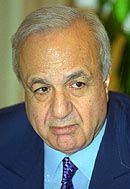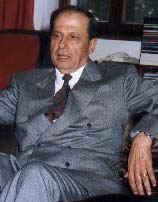 |
| Vol. 1 No. 12 | December 1999 |
With the resumption of Israeli-Syrian negotiations this month, Lebanon is poised to participate once again in the American-brokered peace process. Not many Lebanese are celebrating, however.
 |
| Michel Murr |
Absent from the first round of negotiations this month, the Lebanese negotiating team may find that the ground rules for the talks are already stacked against their country. "The fact that we weren't invited is not a joking matter," said a former Lebanese diplomatic official who participated in the last round of negotiations with Israel in 1996. "There's a serious chance that we're going to be left behind."
It was once widely believed that the peace process would ultimately culminate in the much-awaited withdrawal of Syrian troops from Lebanon as stipulated in the 1989 Taif Accord. Today, few in Beirut express such unbridled optimism--both Israel and the United States have indicated that the issue of Syria's withdrawal is not even on the agenda for discussion in the upcoming talks.
Israeli Deputy Defense Minister Ephraim Sneh told the Jewish Telegraphic Agency (JTA) earlier this month that this issue "is between the Lebanese and the Syrians." Unofficially, the JTA reported on December 12, Israeli officials are "more than willing to have the Syrian soldiers stay on because they are the most reliable guarantor of stability in Lebanon."1
 |
| Michel Aoun |
The U.S. ambassador in Beirut, David Satterfield, has said that the Lebanese should not expect Israel to exert any pressure on Syria to withdraw from Lebanon in the upcoming negotiations. In fact, according to one report, several Lebanese political figures "have received clear messages from American diplomats warning them not to ask for the withdrawal of the Syrian army from Lebanon after the withdrawal of IDF forces from south Lebanon."3 In a lecture widely interpreted as implicitly endorsing the Syrian occupation earlier this month, Satterfield emphasized that the Lebanese people are politically divided and warned of the dangers of political instability. This elicited a strong response from Maronite patriarch Nasrallah Butros Sfeir. "I reject the claim that the Lebanese do not know what they want to do with their country . . . we want Lebanon to be sovereign, free and independent," said Sfeir.
The estimated 2,000 soldiers of the Israeli-aligned South Lebanon Army (SLA) and their families are also apprehensive about a possible Israeli-Syrian peace agreement. Assad is known to be vehemently opposed to an amnesty that would protect SLA members from arrest and imprisonment after an IDF withdrawal. Senior leaders of the SLA, who have been sentenced to death in absentia by the Lebanese Government, are likely to be granted political asylum in Israel or France. The rank and file of the SLA will not be so lucky. Nearly all of the 200+ militiamen who voluntarily turned themselves in after the SLA withdrawal from Jezzine in June have already been tried and sentenced to prison terms by the Lahoud regime.
1 "Israel's plan to pull out of Lebanon may have brought Syria to the table," JTA, 12 December 1999.
2 Ha'aretz, 22 December 1999.
3 Al-Mustaqbal, 22 December 1999
� 1999 Middle East Intelligence Bulletin. All rights reserved.